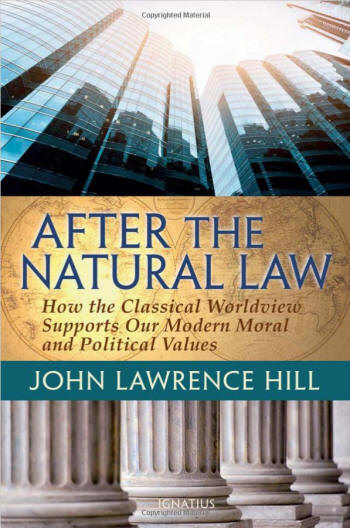Catholic Medical Quarterly Volume 67(1) February 2017
Book Review
After the Natural Law:
How the Classical Worldview Supports our
Modern Moral and Political Values
Authored by John Lawrence Hill. Ignatius Press. (29 April 2016)
ISBN: 978-1621640172
Reviewed by Pravin Thevasathan
 Dr
John Lawrence Hill is a law professor and was received into the Catholic
Church in 2009. This is a marvelous introduction to natural law theory and
he argues persuasively that ethics without recourse to the natural law
tradition leads ultimately to chaos. Natural law, he says, is the idea
that the created order has a moral framework from which we can draw
practical conclusions in order to live the good life. This means that
truth is built into the very fabric of our world: things have been
designed for a purpose.
Dr
John Lawrence Hill is a law professor and was received into the Catholic
Church in 2009. This is a marvelous introduction to natural law theory and
he argues persuasively that ethics without recourse to the natural law
tradition leads ultimately to chaos. Natural law, he says, is the idea
that the created order has a moral framework from which we can draw
practical conclusions in order to live the good life. This means that
truth is built into the very fabric of our world: things have been
designed for a purpose.
He refers to Aquinas as the greatest of the natural law philosophers. For Aquinas, natural law is something that is built inside of us. We have a moral template to form our conscience, something that Aquinas refers to as synderesis. Even our natural inclinations are ordered to the good. In order to be happy, says Aquinas, we need to follow these inclinations.
Of course, natural law theory was developed well before Aquinas. The
author cites Plato, Aristotle and the Stoics as contributors to that
tradition. But it was Christianity which fashioned it into a workable
system.
The author examines some of the criticisms of the natural law
tradition. How can there be such a thing as natural law when people behave
in so many different ways? Because, says the author, human beings have
free will and can depart from the natural law. Indeed, entire cultures can
do so. The Ancient Greeks exposed their infants. We carry out abortions.
It may also be argued that the natural law means whatever comes naturally to us. It may be natural to consider abortion if a woman is made pregnant after being raped. But the word "natural" is being misunderstood here. Nature in the natural law tradition means whatever fulfills us as human beings. We may have to struggle against our desires to be fulfilled. The natural law is about what we ought to do, not what we would like to do.
For Aquinas, a thing is made of matter and form. Our essence is what we really are and from this we can work out how to live the good life. This cannot be done without our understanding of essence. Things of a certain species share a specific nature: Einstein has the same nature as a severely disabled person. It was this that was challenged by William of Ockham, the father of nominalism. For the nominalist, things may resemble each other but they do not share a common nature. If there is no such thing as human nature, then Einstein could be treated in a very different way from the disabled person. The consequences of nominalism are enormous.
The author shows that Enlightenment philosophers like John Locke regarded natural law as something imposed on us from the outside by God. He did not believe that we have a built-in capacity for conscience. Thomas Hobbes also argued in favour of human nature but he regarded it as something disastrous: we are selfish by nature. Presumably, this pessimistic view of the human condition is a direct result of the Protestant revolt. After the enlightenment, science became an "is" and morality an "ought" and the two drifted apart. This leads to the contemporary notion that there is no such thing as objective morality. In the eighteenth century, two alternatives to the natural law tradition were proposed: Kantian deontology and utilitarianism. For the utilitarian, the best course is what leads to the greatest happiness. For the deontologist, ethics is a system of duties and rights. Both systems reject an objective moral order.
This book brilliantly argues in favour of a return to the natural law tradition, the classical worldview.
